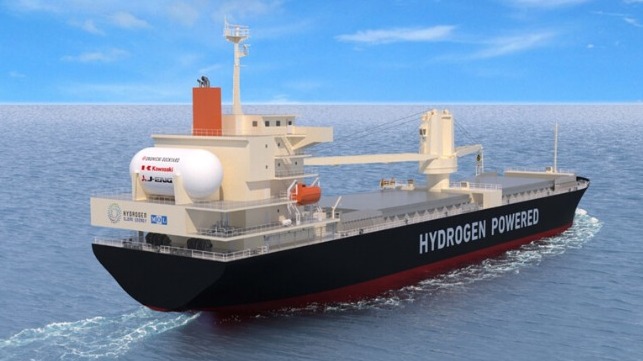Project Achieves Design Milestone for Hydrogen-Fueled Cargo Ship

A Japanese consortium working as part of a government-sponsored project for next-generation zero-emission shipping reports it has achieved the next key milestone in its project focusing on hydrogen-fueled vessels. They received design approval for the proposed layout of the fuel tank and propulsion system for a multi-purpose cargo ship powered by hydrogen. The demonstration project expects to complete the construction of a 17,500 dwt hydrogen-powered vessel in approximately three years.
Class NK (Nippon Kaiji Kyokai) has now issued what they are calling the world's first AiP certification for a ship equipped with a low-speed two-stroke hydrogen-fueled engine for its main propulsion. Project organizers highlight that two-stroke engines are widely employed in the commercial industry and provide some of the most practical and economical operations.
The project announced in May 2023 that it had successfully tested hydrogen fuel injection for a low-speed two-stroke engine. They now expect to install the first engine developed by J-ENG using Kawasaki’s systems aboard a vessel in FY 2026. Demonstration voyages for the vessel are scheduled to begin in FY 2027.
Onomichi Dockyard will take the lead and be responsible for the construction of the hydrogen-fueled vessel. MOL and MOL Drybulk will have ownership of the demonstration vessel and be responsible for its operations.
Japan’s New Energy and Industrial Technology Development Organization (NEDO) launched the projects in 2021 focusing on ships fueled by hydrogen and ammonia. The project led by Kawasaki Heavy Industries and involving Mitsui O.S.K Lines, MOL Drybulk, Onomichi Dockyard Co., and Japan Engine Corporation completed the risk assessment leading to the parcel layout concept for the hydrogen-fueled vessel.

that matters most
Get the latest maritime news delivered to your inbox daily.
Working with ClassNK, the National Maritime Research Institute, and the National Institute of Maritime, they completed the identification of the risks and issues to be considered in further design for the concept of the liquefied hydrogen fuel tank and fuel supply system. The efforts confirmed that the design of the vessel can proceed further based on the current layout.
NEDO is also funding projects focusing on ammonia, including the effort to launch Japan’s first ammonia-fueled tugboat. Work has begun on refitting a tug previously fueled with LNG while another project looks at large-scale ammonia-fueled vessels. The efforts include both the two-stroke engine being developed by J-ENG as well as a separate project focusing on a larger four-stroke engine. They are also funding research to reduce and eliminate methane slip from LNG-fueled engines.
